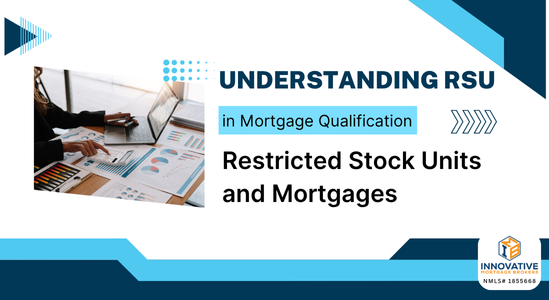Our new portal lets you securely check progress, milestones, and next steps anytime you want…
Understanding Restricted Stock Units (RSUs) in Mortgage Qualification
Restricted Stock Units and Mortgages
When applying for a mortgage, some applicants may receive a portion of their income through Restricted Stock Units (RSUs). These are a form of equity compensation often used by public companies to incentivize employees. While RSUs can be included in qualifying income, doing so involves strict criteria and thorough documentation.
What Are RSUs?
Restricted Stock Units are company shares granted to an employee as part of their compensation package, typically with a vesting schedule. Once vested, they become actual shares the employee can sell or hold. For mortgage qualification purposes, only vested RSUs that have been regularly received and are expected to continue are considered.
Documentation Requirements
To use RSU income, borrowers must provide:
- A vesting schedule showing past and future grants
- Pay stubs showing RSU income if it is part of regular compensation
- Tax returns or W-2s reflecting past RSU income, if applicable
- Documentation from the employer verifying the likelihood of continued RSU grants
The clearer and more consistent the RSU history, the more likely it is to be considered qualifying income.
Income History and Continuity
Most lenders require at least a two-year history of RSU income before considering it for mortgage qualification. This helps establish a pattern and demonstrates that the RSUs are part of ongoing compensation rather than a one-time award.
If the RSU history is shorter than two years, lenders may still evaluate it if the vesting is consistent and the employer confirms future awards. However, caution is typically applied, and the income may be discounted or excluded.
Averaging and Predictability
Lenders will average RSU income over the past two years. For example, if RSUs vested at $15,000 in year one and $20,000 in year two, the average qualifying income would be $17,500 annually, or about $1,458 monthly.
Unpredictable vesting amounts or one-time large awards can complicate this process. In such cases, lenders may use the lower or more consistent figure, or omit RSUs from qualifying income altogether.
Market Volatility and Stock Value
Because RSU value is tied to company stock prices, volatility can be a concern. If the value of vested shares fluctuates significantly, underwriters may adjust how much of the income is counted, or whether it’s counted at all.
Borrowers should be prepared to demonstrate that they routinely sell vested shares and use the proceeds as part of their regular income, especially if RSUs form a significant portion of compensation.
Employer Confirmation and Likelihood of Continuance
A critical requirement for RSUs to be considered is employer confirmation that such compensation is likely to continue. If the employer indicates RSUs are irregular or unlikely to persist, underwriters may exclude them regardless of the income history.
Loan Program Differences
Conventional loans may allow RSU income under stricter guidelines, while FHA and VA programs typically do not accept RSUs due to their variability. It’s essential to check with program-specific criteria to understand what’s allowed.
Bottom Line
RSUs can be used as qualifying income for a mortgage, but only if there’s a strong history, consistent vesting, and confirmation of future awards. Because of their variability and dependency on stock performance, they’re subject to stricter scrutiny than traditional income sources.





